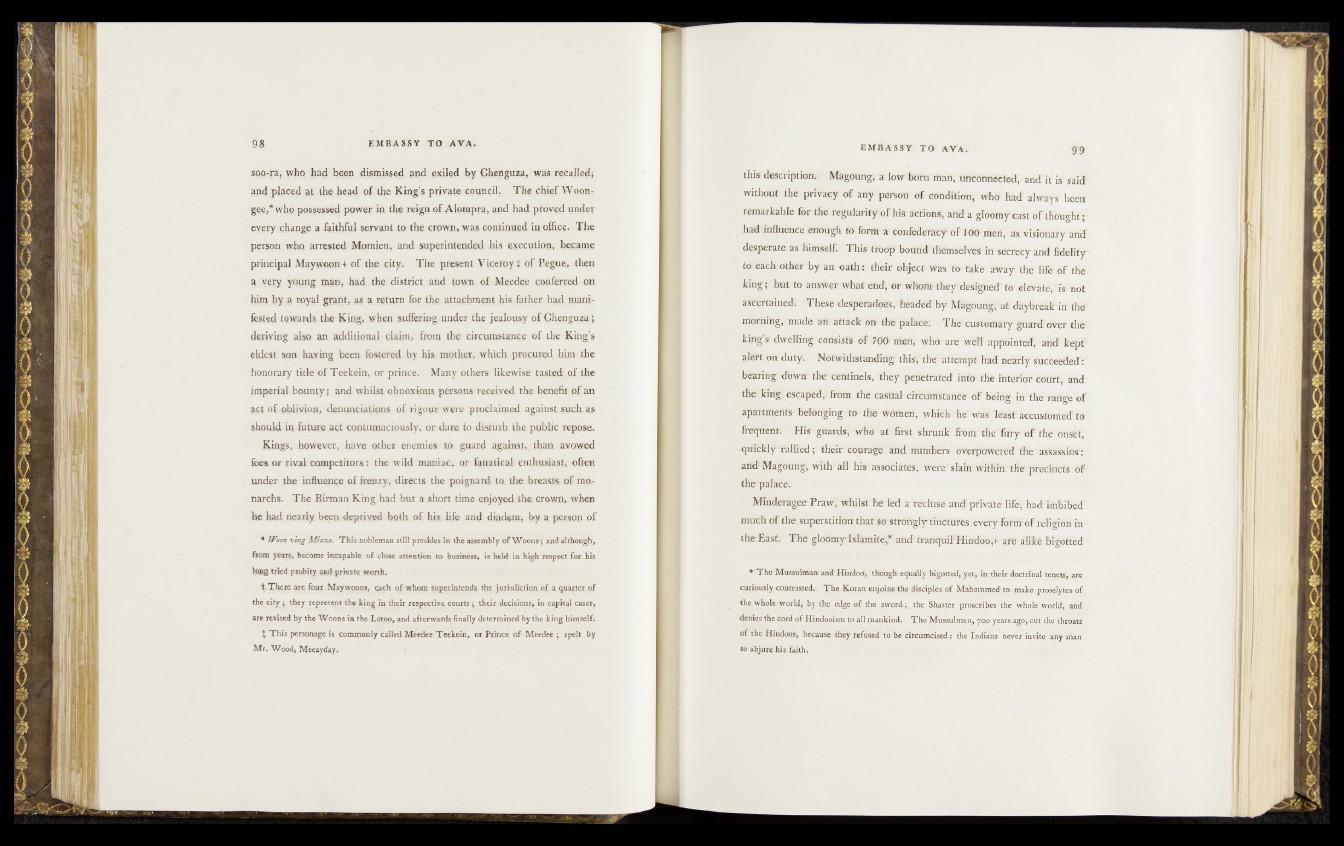
soo-ra, who had b^en dismissed and exiled by Chenguza, was recalled}
a fid placed at tbs bead of the King’s private council, The chief Woom
g e e / who possessed power ip the reign of Alompra, arid had proved under
every change a faithful servant to the crown, was continued in office. The
person who arrested Momien, and superintended his execution, became
principal May woo® i of the city. The present Viceroy $ ofPegue, then
a very young man, bad the district and town of Meedee conferred on
him by a royal grant, as a return for the attachment his father had manifested
towards the King, when suffering under the jealousy of Ghmguga f
deriving ak a an additional claim, from, the circumstance of the.King’s
eldest son having berm festered by his mother, which procured him the
honorary title of Teekein, or prince. Many others likewise tasted of the
imperial bounty s and whilst obnoxious persons received the benefit of an
act of oblivion, denunciations of rigour were proclaimed against such as
should in future act contumaciously, or dare to disturb the public repose.
Kings, however, have ..other enemies to guard against, than, avowed
fees or rival competitors: the wild maniac, o r fanatical enthusiast, often
under the influence of frenzy, directs the poignatd to tbe breasts of mo-
narchs. The Birman King bad but a short time enjoyed- the crown, when
he had nearly been deprived both of his life and diadem, by % person of
* Warn ving Miaztt. This nobleman stilt presides In the assembly of Woons; and'although,
from years, become Incapable of close attention to business, is held in high respect for his
Ipftg tried probity and private worth.
t There are four Maywoons, each of whom superintends the jurisdiction of a quarter of
the city; they represent the king in their respective courts ; their decisions, in capital cases,
are revised by the Woons in the Lotoo, and afterwards finally determined by the king himself*
+ This personage is commonly called Meedee Teekein, or Prince o f Meedee ; spelt by
Mr. Wood, Meeayday. f .
thk description, Magdung;' a low bd#h ffefb tfÉfedhhéCïed, antf ft is' said
tlbr âiff p é t o c & p i é à W ^ - m d . f y ê éM f i r b ë ë i ï
réffl&rfcablO fer fhd r^uiariî^of hlâf aMOnS* a'ticf a gfoumÿ'caféi:Wtfibwgfif j
haddntednète «»ùgfl fei for# # dfafëd^ëbif ôf foû rifeft3,- af*vi$ô‘n&y aniF
desperate Sï himself, TftÉsftFbéJp bottfftf ffl^nsëîVèÿtB'sdSsëî^îhïd fidelity*
tu>eack (Mtef by àrî oaths ffieiit tsfojgfcdWSs fo fake" -Sïïaf thetiB^,o^‘tSè1
fciftgf- but fo aaswer or whoMthfeydesrped? fô-ëld¥âfê, Hmfpl
afeefMKëdç These-deSpterâtfôes, - Ïfeâdéïp by alv<fe;ybrësfk irf théî
nfcWihg,- macte- âS^atffàdk'' étt- the! pafefce'. TKfe cüaîMïîàfy1 guard over (ho
kfrfg?is* dwelling cdïfeiâ® of WfttP arfi Weff appointed; add" kept’
atert ohdUtyS- MOiMtfaiftandïtfg this1;’ ■tflèi a'tfêiïfpf fïadflé^îÿ* ^dcfeÉÉd*/]
béarmgribw®* dWcè»tfrids, M | H Md-(fié iifettdf dlîffd fei#
tllë' kiiîg escaped; - from the casdâf drcufifètanhè’ o f beîrig ftî' tfierâfïgfe d f
apirr trffenth* befenging to- the women, wKfefr hé w^-‘
fresqftiehtr Hfs- guards; who at‘ first sKrtirik fiditf tîie'
qiglÉly'raHfedî: thtefr courage ‘ ad^fflihfbda' overpewei'ea the; aMs^tes*/
an#Magoùhg, withal! his-associates, wfert-S&fri'i^ffhm i #
tKfe'palaee;
• IBfldèl'agee Pravr, whilst* he-fed a-reefee and pfrvate^Fife,• ftade fifthibètf
nîotfi of tfesttperstitferf thartAO‘xth®gfy'ti«ettirës ■ev^Miff opreffgfe^ftt'-
thwEast: The gltmiï^fefâmfre-,^afitPfraïf^î'Hmdbo,^' affe1 affikè Kgjdetécf
•^TThe Mussulman» atfd JEndbO; thfcughi etpiaMy blgorréd^et, i*pdfefr. doctrinal tene®* ate
:COatîraSted*. The Koran enjoins-the disciples ©£ Mahommed to* make proselytes p£f
th e ’whole yforld,-h^^ieMjedge»of t |g sword#; the Shaster proscribes
denies the cord o f Hindooism to all mankind. The* Mussulmen, *joq years a S ^ ^ ^ f f e throats
- b fth e Hindoos, because they refused1, to be circumcised : the^ Indiaiis^ neverihvite any man
to abjufe his faith.